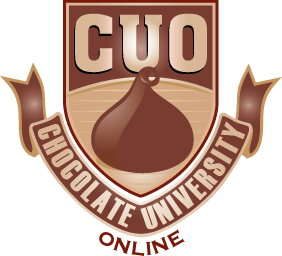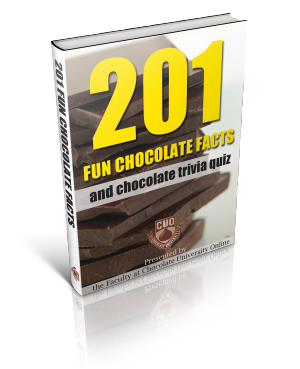The Science of Chocolate
Chocolate may be bittersweet, literally and figuratively. Although chocolate comes with many benefits to your health and pleasure center, there are a lot of facts about it that make it even more interesting.
Sit back, relax, and watch this video.
Categories: chocolate videos Tags: chocolate facts, chocolate info, chocolate science
Truth About Chocolate – Health Food, Junk or Drug?
Chocolate always stirred up controversy. It used to be taken for something health-damaging. It’s said to cause acne. It’s said to cause diabetes. You name it. Chocolate, despite the intense love of people for it, has always had a bad reputation. Nowadays, more and more evidence regarding chocolate’s health benefits are surfacing. Which is which?! What’s the real deal? Watch this video.
Categories: chocolate videos Tags: chocolate facts, chocolate health benefits, chocolate myths, despite, Drug, health benefits
Chocolate and Chemistry
Chocolate is out-and-out delectable and nearly every one of us aren’t precisely aware of the cause why we just can’t defy its appeal. But not the ones who create them, they practically are acquainted with why we find chocolate tempting and it all boils down to chemistry.
Chocolate may be sweet and all that but the main reason behind its unexplainable allure is the fat, according to Professor Dolores O’Riordan of University College Dublin who is based in the Institute of Food and Health. In a speech during the Science week named Smart Chemistry – Tasty Food!, she said “The melting of the fat is very important,”
According to Professor O’Riordan, cocoa butter is the most important fat in chocolate, something the chocolatier has to do some chemistry on. In the said presentation, the audience was comprised of students. Much to their delight, they were given some samples of chocolate and chanced upon some taste test
The size of “fat crystal” shaped during construction was of the essence. Every chocolate has diverse melting points, but what these chocolate makers are usually looking for is one that melts in the mouth. A large fat crystal which melts in the mouth at 33.8 degrees is the best bet.
“Essentially the food we eat is made of chemicals. We process the chemicals within the food to make them safe, to give them texture, to make them look and taste nice,” Prof O’Riordan told her audience.
Chemistry is useful in changing the aroma, color, texture, “and that all affects the food choices we make”, she added. And according to her, contrary to popular belief, additives, preservatives and artificial colors aren’t so bad. She claims that they were basically safe. Interesting enough, the love of chocolate can be passed down to your offspring as Prof O’Riordan said “Genes can also influence our preferences for food,”
There certainly is a selection of food that people are adoring, and chocolate is almost always in our list. Blame it on Chemistry.
Categories: chocolate articles Tags: behind, CHEMISTRY, chocolate facts, chocolate science, down, every, safe
10 Sweet Facts About Chocolate
Chocolate is indeed God’s gift to mankind. It should be a crime not to pay more attention to the little facts about this beloved treat that has been making humans incredibly happy and satisfied for centuries now.
Categories: chocolate videos Tags: chocolate facts, chocolate fun facts, humans, making, treat
Awesome Chocolate Is Awesome
An array of things have already been said about chocolate with regard to its beneficial effects to the human mind and body. Little do we know that deeper investigation and research are being done so as to lengthen the existing long list of the good things about it.
The American Heart Association did a study, reported in their journal named Hypertension. The outcome of which indicated that cocoa, which is the main ingredient of chocolate, has antioxidants that aids in improving mild cognitive impairment in the elderly.
The said research involved a group of aged participants, who in a span of two months, were supplied with drinks that have different cocoa flavonol levels. Such process produced results displaying that the ones who received the highest of these doses exhibited progress in a few cognitive tasks, which includes memory function.
Other flavonol rich products, aside from chocolate, include red wine, apples, tea as well as berries.
Moreover, new studies look back at past studies to compare. They have found out that cocoa products high in flavonols may contain a small, but very significant role, in lowering high blood pressure.
More to these, it also aids in alleviating risks for heart disease, stroke, diabetes, and aging problems.
Nevertheless, keep in mind that too much of everything is bad enough. Yes, chocolate can do you good but it can backfire when you go overboard. Take slow steps, and always eat in moderation.
Furthermore, dark chocolates have more cocoa in them, hence an increased sense of beneficial effects. White chocolate does not contain cocoa at all, sad to say. All chocolates are high in calories and sugar, it’s not a secret anymore. You would not want to overgrow your favorite clothes or be swimming in a bed of ants.
Many people tend to be hard on themselves by depriving themselves of chocolate. That’s not ideal. If you want to enjoy it, throw away the guilty thoughts and savor it the healthy way. Better!
Categories: chocolate articles Tags: aids, chocolate facts, chocolate lovers, chocolate studies, chocolate tasting, cocoa, research, things
Is White Chocolate Really Chocolate?
Albeit the fact that it is considered ‘chocolate’, white chocolate isn’t really chocolate. It may be a confectionery imitative of chocolate since it’s also made from the same cacao plant, but its manufacturing process is somewhat special.
The process of making white chocolate primarily involves the drawing out of utilizable components of the cacao bean. Unlike the usual chocolate that makes use of the cocoa powder ground from the seeds, the white version uses only the cocoa butter.
Even though the manufacturing of white chocolate is similar with dark and milk chocolate by some means, it basically lacks cocoa paste, liquor or powder. Thus, it does not hold the important compounds of chocolate such as thiamine, riboflavin, theobromine, phenylethylamine, and serotonin.
According to the U.S. Food and Drug Administration, to be called ‘chocolate’, a product must have chocolate liquor. Since 2004, white chocolate have to be (by weight) at least 20% cocoa butter, 14% total milk solids, and 3.5% milk fat, and not exceeding 55% sugar or other nutritive carbohydrate sweeteners. The European Union has put the same policy in practice, only, there is no limit on sugar or sweeteners.
White chocolate is made up of cocoa butter, milk solids, vanilla, sugar and lecithin. Chocolate makers that use true cocoa butter generate ones of higher quality in comparison to those who scrimp and substitute vegetable fat for the cocoa butter.
True white chocolate is typically a pale yellow or ivory in appearance. The taste of cream and vanilla is heavenly in the mouth unlike those pretentious white creations that are made up of vegetable fat. Their consistency, taste and shelf life are also extremely different.
White chocolates melt quite easily and burn quickly since it is delicate, so take extra care when melting it for recipes like ganache or chocolate fondue.
Related Chocolatier Articles
Categories: chocolate articles Tags: butter, chocolate facts, chocolate information, process, White Chocolate
Dutch Processed
Sometimes people ask me “What is Dutch Process Chocolate?” Basically, this is chocolate that has been treated with an alkali. The process results in enhanced color, lower acidity, better solubility, and less flavor.
Back in the 1820’s a Dutch chemist by the name of Van Houten developed the process by which one can darken chocolate as well as reduce its bitterness. Unfortunately this process also reduces the chocolate flavor.
Even so there is a perceived benefit to the consumer. The darker chocolate color is generally thought of as being of higher quality. (It’s best to read a label because “dark chocolate” is not Dutched, rather dutched chocolate is darker than its non-Dutched counterpart.)
The darkest, chemically altered cocoa is called black cocoa. And, it’s the ingredient in the top and bottom parts of Oreo cookies.
While we might like the look of the darker chocolate, the Dutch process greatly reduces the antioxidant benefits of chocolate. So if you are looking for healthy chocolates avoid Dutch process.
You can learn more chocolate facts at Chocolate University Online.
Categories: chocolate articles, chocolate nutrition, chocolate process Tags: chocolate facts, chocolate information, dutch process




